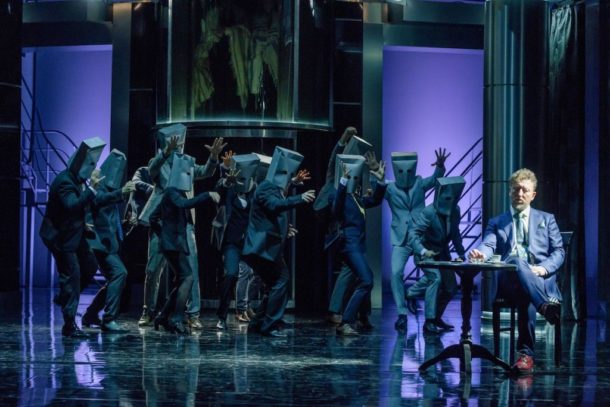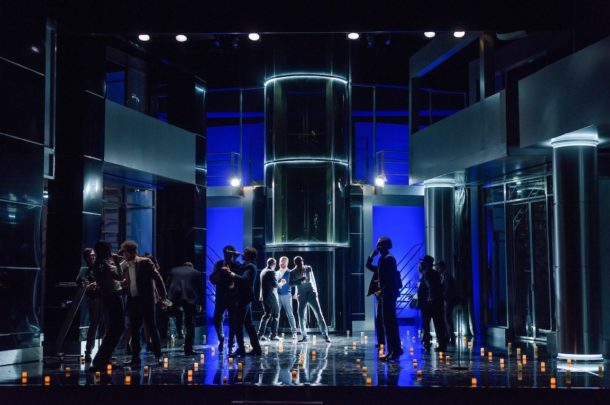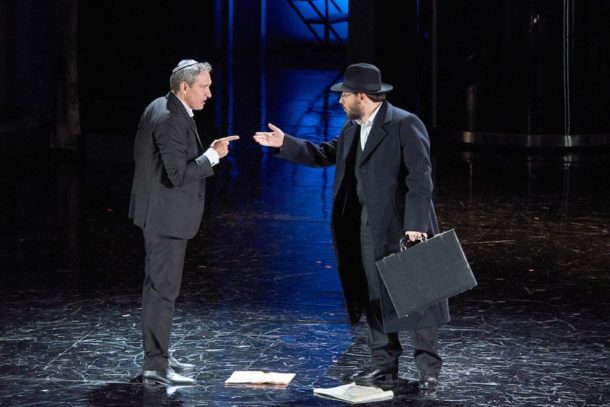It has been said about Hamlet that it stands for one thousand plays. It is the staging option that makes the difference. This “sponge-play” (to paraphrase Jan Kott) can be approached as a metaphysical, political, philosophical, psychoanalytical tragedy, a thriller, a love or betrayal story, a horror or family drama… This comment may also apply to other Shakespearian texts, even though the scholars have classified them as tragedies, comedies or historical plays. Strict categorization is always misleading in Shakespeare’s case. What You Will, the subtitle of the comedy Twelfth Night, seems to suggest that the author is challenging his readers: “Take what you will from my play.” It is a possible suggestion that has often been presumed by the translators and the directors…
The suggestion has been taken over also by the director Gábor Tompa, who chose to stage The Merchant of Venice at the Hungarian Theatre of Cluj, where he has been Artistic and Managing Director since 1990, thus ranking a well-deserved first place in the longevity top of theatre managers in Romania. He also chose to stay true to the Shakespearian opus in Ádám Nádasdy’s modern translation and András Visky’s dramaturgy. Moreover, he generously endows the audience with the right to choose from the show “what (and how much) they will”: Shakespeare’s play, the Venetian merchant’s story or that of the Jewish moneylender, the love story forbidden by the family or religion, xenophobia, anti-semitism, feminism, sexuality, pure or bitter comedy, inner jokes or stand-up comedy, the Venice of times gone by or the present day Wall Street, the eternal controlling power of money, the individual acting performances or those of the whole company, the rock music or the super-technological set. Whatever “you will”…
The story of The Merchant of Venice originates in writings dating from the Middle Ages and became known due to Christopher Marlowe’s play, The Jew of Malta, written a few years before Shakespeare, at the end of the 16th century. Although having circulated for a while under the title of The Jew of Venice, Shakespeare’s play points to a different main character, the rich merchant Antonio. He will warrant for Bassanio, his squandering friend who needs a large amount of money in order to cover his expenditures as a suitor for his beloved, the beautiful and rich Portia. Antonio’s resources are presently invested in his business, in ships sailing the seas with merchandise on board. As the matter involves some urgency, Antonio turns to the services of a Jewish moneylender, Shylock. They hate each other deeply, but other interests prevail: one of them wants to help out a friend, the other one wants revenge for all the insults he had endured, over time, in the Christian society. They conclude a strange, unusually harsh contract. In case of failure to repay the debt in time, there will be no interests due, but Shylock will be entitled to take a pound of flesh from Antonio’s body, near the latter’s heart. Bassanio obtains the money and through his wisdom he gets Portia’s hand, by solving the riddle left by the girl’s father in his will, as a condition for the marriage.
A secondary plot presents Shylock’s daughter, Jessica, who is in love with a young Christian man named Lorenzo. She elopes with money and jewelry taken from home, in order to be able to marry the young man. On discovering the facts Shylock confesses that he would rather see his daughter dead at his feet, but with the jewelry in her ears and the money in the casket.
In the meantime, Antonio’s ships are lost at sea, leaving him bankrupt, so that on the due day the contract must be fulfilled. What could have possibly ended in tragedy is avoided due to the unexpected twists of fate which are so brilliantly controlled by Shakespeare’s genius, without, however, transforming the play into a sparkling comedy. After more than four centuries, Shylock’s pleading for the Jews and Portia’s monologue on pity are reference points in the history of dramaturgy and acting.
Displeased, maybe, by the (apparently) reduced importance attributed by Shakespeare to Shylock, the subsequent playwrights took over the earlier mentioned challenge. And gave the Jew what belongs to the Jew… Thus, in the ’70s, the ex-“angry young man”, Arnold Wesker wrote The Merchant, a play whose main character is Shylock, and, at the end of the ’90s, another British theatre man, Gareth Armstrong, wrote a text entitled just Shylock, where the character is presented from the point of view of the other Jew from the original play, Tubal.
For his staging at the Hungarian Theatre of Cluj, the director Gábor Tompa does not select a “ranking” of the characters (Shylock vs. Antonio), he does not choose to have the scales tip to one or the other side (Judaism vs. anti-semitism), but decides to present the contemporary world as being suspiciously similar to the one depicted by Shakespeare four hundred years earlier. Obviously the world has changed. And the imaginary Venice has acquired different contours. We find ourselves, initially, in a cold, steel and glass, corporate, aseptic space, but, alas, much contaminated by the power of money and Machiavellism. Characters governed by those goals – known to justify the means – live amidst screens showing the latest stock exchange information. And they change as soon as their interests are at stake.

The Merchant of Venice. Photo Credit: István Biró.
An external, transparent elevator connects, vertically, the worlds that are well aware of their place in the hierarchy. Dragoş Buhagiar’s large size set is renewing itself during the show with the help of a lighting design conceived by László Erőss and of the video imagery created by András Rancz. The narrative shall carry us through different spaces – internal and external – in a way that only Shakespeare knows to do: almost the way a movie does. Portia’s house is another opportunity to throw ironical arrows towards the (newly) rich of the day: lavish furniture on the verge of kitsch. No wonder the portrait picture hanging on the most outstanding place shows the smiling face of Berlusconi, who is associated – in our story – with the wealthy father, the perfidious inventor of the match-making lottery.

The Merchant of Venice. Photo Credit: István Biró.
This is not the only joke generated through the translation of the story into reality. On the contrary: the show abounds in such well-sustained examples. To discover them is a great joy for those who are familiar with the Shakespeare’s play. The other members of the audience will have fun at the comedy developing on the stage, will recognize contemporary characters and will be excited to see the tragic episodes taking place in the same intense contemporaneity. And everyone will admire the team of The Hungarian Theatre of Cluj operating meticulously both individually and as an assembly. Twenty actors, mostly men, are on the stage, in accordance with the Shakespearian text. It is a show of masculinity – by power and rhythm. It is a show with a lot of men in a world governed by men. Neither Portia, nor Jessica will prevail, although they seemingly reach their goals, demonstrating women’s intelligence and force. As usual with Shakespeare, the gender spiral takes us to the field of psychonalysis: anima and animus. “The traditional family” does not stand a chance. However, all of them – men and women – pursue their interests (irrespective of their nature) to the very end, even if this is the way into perdition for some of them.
The interest of the rich and arrogant “merchant” Antonio – remarkably played by Gábor Viola – is Bassanio’s love, his friend, who is as foolish in matters of love, as in matters of money – Balázs Bodolai. He desires Portia (actually, her wealth). This is the starting point of the whole drama.
They are joined by their friends/partners of circumstance – portrayed with much humor and great care for details by Ervin Szűcs, Loránd Farkas and Szabolcs Balla. They are also responsible for the actual musicality of the show. As members of the Loose Neckties Society band, they pick up their instruments and carry us through different decades of the wired rock: from the ’60s – with Beatles and an ironical paraphrase, Hey Jew, then to the ’80s – with Judas Priest and Breaking the Law, till the end of the ’90s – with Liquido and Narcotic, a song that obsessively returns to one’s mind, long after the show ends.
Antonio’s howling when faced with the contract fulfillment suggests the slaughtering of an animal and will not be easily forgotten. Duplicitous in love, men hide their cowardice in violence and ridicule under haut couture suits (even if they are only bathing suits). Also ridiculous are Portia’s “non-winner” suitors – excellently interpreted in comical register by Loránd Vata and Ferenc Sinkó. Not even their predecessors are spared, although they only appear as pictures in dating catalogues (a good inside joke.) The Doge of Venice himself is also ridiculous, portrayed as the politician eternally interested in his positive media exposure – and interpreted with his characteristic seriousness by Áron Dimény. And the never-missing Shakespearian jester is present as a stand-up comedian played by the young Csaba Marosán. “Everything for everyone”.

The Merchant of Venice. Photo Credit: István Biró.
The female characters enjoy very carefully nuanced interpretations. Enikő Györgyjakab, “the poor rich girl” Portia, crosses the stages of the wise woman with a prima-donna detachment: a (willy-nilly) obedient daughter, passionate lover, resigned wife (of a not exactly faithful husband). None of these “functions” allow her, though, to put her native wisdom to use; for this she is obliged to adopt a male disguise. Csilla Albert, in the role of Nerissa, the soubrette and confidant, doubles her energetically in the comical mirror, so that they go through the stages in tandem.
By revisiting the text, Gábor Tompa outlines a triangle of characters. These no longer come from the comedy area. Jessica, the daughter of Shylock, the Jew, is no longer a nice girl in love with a Christian boy. She becomes a rebellious teenager, revolting against the father, but also against the world she lives in. She chooses immediate solutions – drugs, sex –, but also running away from home. In the end, she will fit nowhere, and will be longing for the lost traditions. Éva Imre delicately traces her journey, together with Péter Árus, playing her lover and husband-to-be. He will not find happiness, either, although he seems to have a little more humanity than the surrounding young men.

The Merchant of Venice. Photo Credit: István Biró.
Finally, the role of Shylock, carrying the whole historical heritage in terms of dramaturgy and the art of acting, has been assigned to Zsolt Bogdán. Aware of and mastering all of this, he builds a hero who ignores the legend, a man with his good but mostly malicious features. He equidistantly defends the character, without trying to persuade the audience to take his side. It becomes the spectator’s task to tip the scales, to choose to blame him for his desire to revenge, or even worse, to see his daughter dead, or to understand the suffering gathered in the past history and to dread the violent scene of the forced “baptism”. Choices…
A character like Shylock might be counted among the rulers of the world… But at the price of how many humiliations… Up there, in the elevator, above the world, the character is alone. It is a world in which we have trouble to find our place, whoever we might be or wherever we might come from. It is a world in which we are alone, no matter how much we socialize virtually or in underground clubs. It is a merchants’ world.
In spite of all this, The Merchant of Venice of the Hungarian Theatre of Cluj is a comedy. An accomplished one. It highlights a team full of intelligence and humour, a model of artistic force and creative discipline in the last Romanian decades.
Maria Zărnescu (b. 1969, Bucharest, Romania) is a theatre theorist and critic, Associate Professor and Head of Theatre Studies Department at the National University of Theatrical Arts and Cinematography “I.L. Caragiale” Bucharest. Author of books: Music and Muses (2015) and The Sound of Theatre Music (2016). Theatrical and musical reviews, studies and essays published in Romanian and international journals. The Romanian Association of Theatre Professionals UNITER Award for “Best Theatre Critic” in 2015. Consolidated experience as a radio journalist and manager, TV editor, and event producer.

European Stages, vol. 13, no. 1 (Spring 2019)
Editorial Board:
Marvin Carlson, Senior Editor, Founder
Krystyna Illakowicz, Co-Editor
Dominika Laster, Co-Editor
Kalina Stefanova, Co-Editor
Editorial Staff:
Joanna Gurin, Managing Editor
Maria Litvan, Assistant Managing Editor
Advisory Board:
Joshua Abrams
Christopher Balme
Maria Delgado
Allen Kuharsky
Bryce Lease
Jennifer Parker-Starbuck
Magda Romańska
Laurence Senelick
Daniele Vianello
Phyllis Zatlin
Table of Contents:
- Introductory Note by Kalina Stefanova.
- “Andrzej Tadeusz Wirth (1927 – 2019) – White on White” by Krystyna Illakowicz.
- Lithuanian Marriage in Warsaw or The Last Production of the Great Eimuntas Nekrošius by Artur Duda.
- “My, Żydzi polscy [We, Polish Jews]”: A Review of Notes from Exile by Dominika Laster.
- A Report on the State of Our Society, According to Jiří Havelk in The Fellowship of Owners at VOSTO5, Prague, and Elites, at the Slovak National Theater, Bratislava by Jitka Šotkovská.
- About Life as Something We Borrow. On the Stages of Pilsen (In the 26 th edition of the International Theatre Festival There) by Kalina Stefanova.
- Redesigning Multiculturalism or Japanese Encounters in Sibiu, Romani, The Scarlet Princess, written and directed by Silviu Purcărete, inspired by Tsuruya Namboku IV’s Sakura Hime Azuma Bunshô by Ion M. Tomuș.
- About Globalization: A “Venice Merchant” on Wall Street, at the Hungarian Theatre of Cluj in Romania by Maria Zărnescu.
- The Patriots, Mary Stuart and Ivanov and the Rise of the Drama Ensemble of the National Theatre in Belgrade by Ksenija Radulović.
- The Unseen Theatre Company or How to See Beyond the Visible: The Shadow of My Soul and the Theatre of Velimir Velev by Gergana Traykova.
- Multilingual Pirandello, Understandable to Everyone: The Mountain Giants at the Croatian National Theatre “Ivan pl. Zajc”, Rijeka by Kim Cuculić.
- The return of the repressed: the ghosts of the past haunt Barcelona’s stages by Maria M. Delgado.
- A poetics of memory on the Madrid stage (2018) by Maria M. Delgado.
- The Danish National Theatre System and the Danish National School of Performing Arts: December in Copenhagen 2018 by Steve Earnest.
- Towards a Theatre of Monodrama in Turkey 1 by Eylem Ejder.
- Where Is Truth? Justiz by Friedrich Dürrenmatt, adapted and directed by Frank Castorf at the Schauspielhaus Zürich by Katrin Hilbe.
- Report from Vienna by Marvin Carlson.
www.EuropeanStages.org
europeanstages@gc.cuny.edu
Martin E. Segal Theatre Center:
Frank Hentschker, Executive Director
Marvin Carlson, Director of Publications
©2019 by Martin E. Segal Theatre Center
The Graduate Center CUNY Graduate Center
365 Fifth Avenue
New York NY 10016
European Stages is a publication of the Martin E. Segal Theatre Center ©2019
Martin E. Segal Theatre Center:
Frank Hentschker, Executive Director
Marvin Carlson, Director of Publications
©2019 by Martin E. Segal Theatre Center
The Graduate Center CUNY Graduate Center
365 Fifth Avenue
New York NY 10016
European Stages is a publication of the Martin E. Segal Theatre Center ©2019



